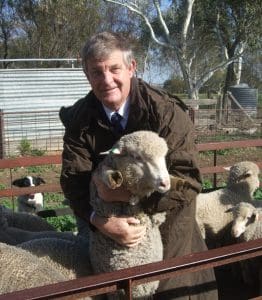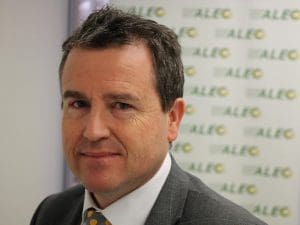
Senator Chris Back.
AN $8.3 million Federal Government investment in the proposed Livestock Global Assurance Program was “a step along” the journey to resumption of the Saudi Arabia sheep trade, Western Australian Senator Chris Back said today.
“I don’t think it is the only step — clearly we have got to deal with the situation of the Saudi government’s view over sovereignty.
“Where I think this will help, of course, is that it feeds into our commitments under OIE standards.”
The Coalition’s 2017/18 Federal Budget commitment of $8.3 million over four years has been welcomed by the Australian Livestock Exporters’ Council as helpful to LGAP’s implementation.
ALEC said LGAP is a proposed global conformity assessment program for livestock exports that would protect the welfare of animals, and foster continual improvement and the attainment of best practice. The first-tranche in Commonwealth funding support for LGAP follows an election commitment made by the Coalition last year, ALEC said in a statement today.
ALEC chief executive officer Simon Westaway said the council believed the Australian Government’s commitment towards LGAP can further strengthen and drive improvements across global supply chains.
“Australian livestock exporters are committed to delivering and demonstrating enhanced compliance with Exporter Supply Chain Assurance System standards as well as driving animal welfare improvements across global livestock supply chains.”
Senator Back confident Saudi concerns can be addressed
Live sheep have not been exported to Saudi Arabia from Australia since August 2012 due to the country’s concern that ESCAS would impinge on its sovereignty. Saudi Arabia was once one of Australia’s biggest live sheep markets and it has been estimated a resumption of the trade could be worth up to $100 million, taking up to a million sheep and 100,000 cattle annually.
Senator Back said he believed the Saudi government’s sovereignty concerns can be addressed if the country was able to embrace and to work toward an independent audit system compliant with OIE standards.
“One of the benefits of Livestock Global Assurance Program is that it is, in a sense, interpreting ESCAS as it applies to Australia and it is widening more to the global scene.
“Australia has, and continues to lead the world, when it comes to animal welfare standards in our target markets,” he said.
“We are only one of 109 countries in the world that exports live production animals, yet we are consistently the only country in the world that has and is investing time, people and expertise in lifting animal welfare standards in our target markets,” he said.
“It is one of the reasons that I will be very, very keen to see us re-establish our trade with Saudi Arabia.”
Senator Back said he was involved with the trade as a livestock veterinarian in the 1980s when Australia was exporting sheep and cattle to Saudi Arabia.
“I believe we can and should be back in there both for livestock and for meat.
“We won’t back in there for one of those until we are in there for the other; that’s always been the pattern.”
Senator Back said when Australia lost its live trade to Saudi Arabia, it also lost access to the country’s meat trade.
“From a global perspective, I believe the move that has been made and the funding that has been put in place will not only be of assistance for Australia and Australian livestock exporters, I think it will also feed into OIE standards which will then continue to be the international standard for the handling of livestock in the markets.”
Industry cannot afford to have two live export assurance systems

ALEC CEO Simon Westaway.
Emanuel Exports managing director Graham Daws said LGAP is a quality system for all markets including Saudi Arabia and thus far it has qualified support from the industry.
“An implementation committee has the task to drill down on several aspects of LGAP before it can be fully endorsed.
“It then requires full consultation and explanation to all importers; however, one issue must be understood and that is that industry cannot afford the duplications that will arise in having two systems.”
Mr Westaway said ALEC members have provided in-principle support for LGAP, and its initial implementation and success is reliant on a series of factors currently being considered in full consultation with key producer groups within the Australian red meat supply chain alongside LiveCorp and the MLA.
He said industry understood both first and ongoing tranches of funds from DAWR were predicated on the approved implementation of LGAP.
“Under LGAP, the Australian Government will still remain the regulator of the Australian livestock export industry.
“The trade has never self-regulated and that won’t change under LGAP,” Mr Westaway said.
“LGAP will be a regulatory enabler at arms-length from industry, run by a program owner under a mixed-membership model.
“We do however believe LGAP offers an improved and strengthened system which has been conceptually designed to provide assurances that animals are treated in accordance with the ESCAS standards from discharge to the point of slaughter,” he said.
“ALEC and our members thank the Australian Government for its support thus far and look forward to progressing the LGAP implementation process further in the coming months,” he said.



Here we go again with Senator Chris Back pushing to lower the standards of ESCAS to suit Saudi Arabia, so that they can get on the live export band wagon. This makes me think that Senator Back still has a financial interest in the live trade, which makes this “push” a conflict of interest by parliamentary standards.